Intel X25-M SSD: Intel Delivers One of the World's Fastest Drives
by Anand Lal Shimpi on September 8, 2008 4:00 PM EST- Posted in
- Storage
Game Load Performance
I looked at three games for load time performance and I picked these titles because they run the whole spectrum of how well an SSD will work in a gaming machine. First up is Spore.
Here I'm timing how long it took to load the next stage of evolution in the game, my character just grew legs and is about to walk on land for the first time:
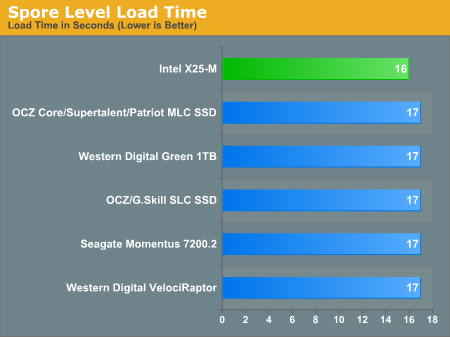
You'll see that the results are pretty much the same on all of these drives, we're reading from the disk but we're bound elsewhere in the system - an SSD won't do anything for you here and there are many games where you won't see improvements in load times.
Next up, Oblivion - I'm simply loading a savegame:
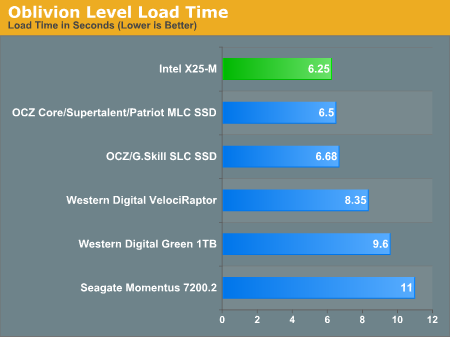
Compared to notebook drives, the SSDs do extremely well. Against the 3.5" competitors, the margins are smaller but there - you shave a couple of seconds off of the VelociRaptor's time, more off of the 1TB WD drive (or any other 5400RPM drive). For some reason these sorts of performance gains are far less noticeable in real world usage than the improved application launch times. Perhaps it's because when you're playing a game it's all you've got going on and you're more patient, whereas when launching a web browser or an application you're trying to complete a task where time is more valuable. I'll refrain from any more psychological analysis and stick to the drives though.
Finally we get to Crysis, and this is the other end of the spectrum because Crysis is a game that is very demanding on the I/O subsystem. We've got three results here: 1) How long it took to launch the game and load the benchmark level, 2) Minimum FPS, 3) Average FPS. I'm only reporting the minimum and average frame rate of the first run, because in that run of the benchmark the textures and level data are still being streamed off the disk and it actually impacts both minimum and average frame rate.
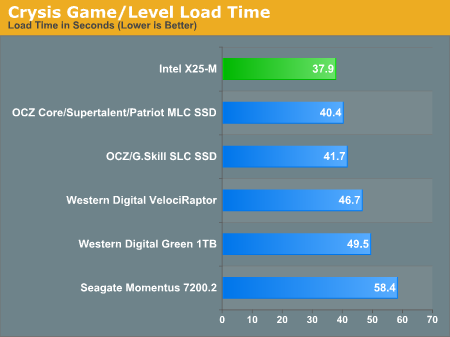
The Intel X25-M manages to load the game and benchmark level in around 80% of the time of the VelociRaptor and about 90% of the time of the Samsung SLC SSDs. Compared to notebook drives the performance advantage is staggering. Game load and level load performance can be improved and Crysis is a good example of that.
The minimum frame rate graph is very interesting because it shows the impact loading textures from a slow disk can have on minimum frame rates in a game. The Crysis test is a bit exaggerated since it's streaming data as fast as possible, which you don't always do in a game, but if you've ever felt your game grind to a halt and hear your disk thrash this is a good test of that.
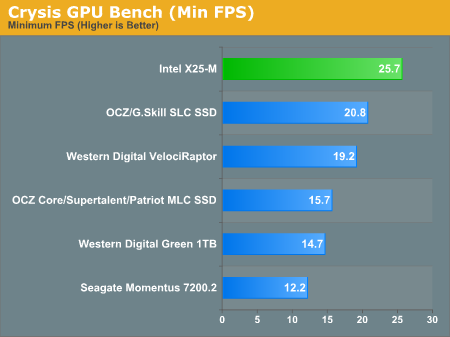
The X25-M has a 33% advantage here over the VelociRaptor, and I won't even mention the utter destruction of conventional 2.5" HDDs. Compared to other SSDs, the Samsung SLCs come the closest but Intel still manages a 25% advantage. The JMicron based MLC drives suffer terribly here, Intel's MLC drive is 63% faster. I will also point out that for a couple of runs the JMicron MLC drives managed a minimum frame rate of 3 fps, several of those lovely pauses happened in the middle of the benchmark which really changed things. The phenomenon was random enough that I reported the more common frame rate but it's worth pointing out that the pausing issue can happen while gaming, which would be bad if you're playing any sort of multiplayer game.
Average frame rate is obviously affected, but you can see that the numbers are much closer indicating that the minimum frame rates are at least not sustained for long periods of time.
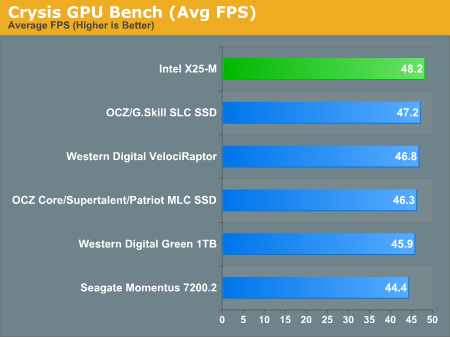
What can we conclude here? SSDs can be good for gaming, but they aren't guaranteed to offer more performance than a good HDD. And where SSDs do offer an impact on gaming performance, Intel's X25-M continues to dominate the charts.










96 Comments
View All Comments
aeternitas - Thursday, September 11, 2008 - link
Wow.#1 Meaning; Great read.
#2 Meaning; Why do you not use World of Warcraft in your testings more? This game still has huge system requirements on absolute full settings in crouded areas. No one is getting 60fps in that game in Shatt on a saterday night 16xAA/AF full distance view. Everything maxed running a high resolution. Also, the disk access of this game may not be as much as Crysis, but its far FAR more prolonged as people play this game for a matter of years, instead of a handfull of months tops.
hoohoo - Wednesday, September 10, 2008 - link
What?! Google Chrome Launch Time? Is this a new benchmark? The world was waiting for that test I can tell ya! Did Google slip a little something in your pocket?Ph0b0s - Wednesday, September 10, 2008 - link
Sorry if this repeats what anyone else has said, but I think this is the best harddisk review I have seen. All the other hdd reviews I have read though, all go into detail about how many mb/s the drive can transfer and what the access time is, I/O performance etc. This is all very nice, but all we really care about is how does the hdd perform in real world apps and games in comparision to other drives. How much faster is my browser going to load.And that is why I was so impressed with this review. I realise it probably took more time to create this review, but it was well worth it. You can see how much the drives in the comparision compare to the amount of money you will spend instead of having to extrapolate from throughput benchmarks.
I would feel a lot more confident in putting down money on the X25 after this review. Because I can see what the benefit I would get after in comparsion to other drives. Though the X25 needs to be another $100 dollars cheaper...
Anyway, please more hdd reviews like this...
bruto - Wednesday, September 10, 2008 - link
Anand, could you please post map load times for R6 Vegas 2 usingthese drives?
That game was killing me, and I'd like to know just how much
happiness is around the corner :)
FFFFFF - Tuesday, September 9, 2008 - link
I am very familiar with the tech works of SSDs and it is interesting to know of the security risk that involves the technology. http://www.techworld.com/SECURITY/NEWS/index.cfm?n...">http://www.techworld.com/SECURITY/NEWS/...cfm?news...This is one reason why I am not going to upgrade to SSD just yet till they figure out a more secure encryption.
cokelight - Tuesday, September 9, 2008 - link
RE: PLEASE LEARN HOW TO USE COMMAS! by ggordonliddy, 19 hours agoYou are just making it clear that you do not have a firm grasp of English. You are afraid of those who criticize poor grammar, because you know that you yourself will be exposed for the fraudulent pustule that lies beneath your slimy veneer.
I have a life. I'm just sick of illiterate authors. Just because it is a tech site is no excuse for extremely poor writing skills. I'm talking about skills that should be completely mastered before being allowed to graduate from elementary school.
^
Take your elitism elsewhere. If you actually practiced what you preached then you'd note your own comma abuse:
"You are afraid of those who criticize poor grammar, because you know that you yourself will be exposed for the fraudulent pustule that lies beneath your slimy veneer."
The second clause is dependent. Therefore, it does not necessitate a comma.
aeternitas - Thursday, September 11, 2008 - link
Use the reply link.xenon83 - Tuesday, September 9, 2008 - link
"Do keep in mind though, the numbers we're talking about here are ridiculously low - even 900 µs to write to MLC flash is much faster than writing to a mechanical hard disk."But when it comes to random writes ssd's in general - this intel ssd included - fails miserably.
http://www.alternativerecursion.info/?p=106">http://www.alternativerecursion.info/?p=106
johncl - Wednesday, September 10, 2008 - link
Yes as the other poster say, the Intel drive have solved the issues with small random writes that the OZC and other MLC drives so far have been suffering from. If you read the whole article thoroughly you will see that clearly.Lets hope OCZ can come up with a better controller in their next generation MLC SSDs. We really need the competition here to bring those prices down, the Intel drive is a tad too expensive atm imo.
balotz - Tuesday, September 9, 2008 - link
Random writes are exactly as fast as sequential writes on this Intel SSD (10,000 random 4k writes per second).The article you referenced uses data from an SSD which appears to suffer from issues relating to the JMicron controller.
The Intel SSD is obviously not affected, this is clearly shown by the numbers in this very review!